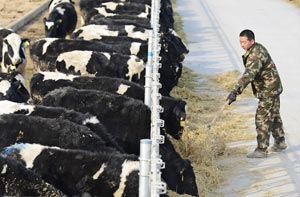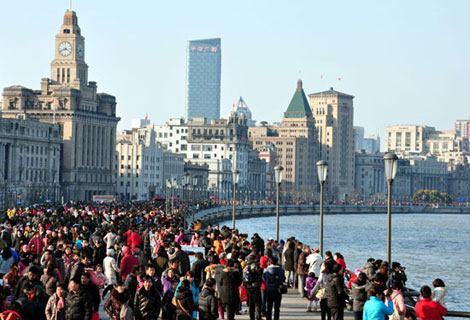
The central bank usually needs to inject or withdraw liquidity in the market to counteract fluctuation of foreign reserves to maintain a stable exchange rate for the national currency.
Li suggested the government divide foreign reserves into different categories, leaving only a small portion to be managed by monetary authorities.
He made the remarks in Beijing where the academy's annual report on China's financial development was released.
In the report, the think tank estimates credit supply in 2013 will increase by 16 percent from the end of this year, while M2 - a broad measure of money supply that covers all deposits and cash in circulation - is likely to increase by 15 percent.
"Judging from history, such a pace would keep a reasonable balance between the goal of shoring up the economy and curbing inflation," the report said.
During the annual Central Economic Work Conference last weekend, authorities confirmed proactive fiscal and prudent monetary policies for 2013.
Ji Zhihong, director-general of the research department at the central bank, said a 16 percent increase in new credit is too much for the economy.
"Actually, the growth in new loans might be the same as that of this year."
Peng Xingyun, a researcher at the academy's Institute of Finance and Banking, said although the monetary stance next year is expected to be somewhat looser, and with more new loans than in 2009, credit growth will be much lower than the pace of more than 30 percent at that time, meaning fewer side-effects, such as asset quality deterioration and inflation.
He forecast the inflation rate will be kept below 3 percent throughout 2013.
China to promote reforms and opening-up:
Xi: China to continue reform and opening-up
Li calls reforms key to sustaining development
China to firmly promote economic reforms, opening-up
Reforms to give more weight to capital exports
 KIA launches 2014 Cadenza premium sedan
KIA launches 2014 Cadenza premium sedan
 Kiwi cows arrive in Ningxia
Kiwi cows arrive in Ningxia
 Harbin Int'l Ice and Snow Festival kicks off
Harbin Int'l Ice and Snow Festival kicks off
 Overseas yuan gets nod in mainland PE market
Overseas yuan gets nod in mainland PE market
 World's largest spokeless Ferris wheel under construction
World's largest spokeless Ferris wheel under construction
 Blazing a trail in the workplace
Blazing a trail in the workplace
 Antique car investment set to boom in China
Antique car investment set to boom in China
 Super sports car makers to ignite passions on the mainland
Super sports car makers to ignite passions on the mainland